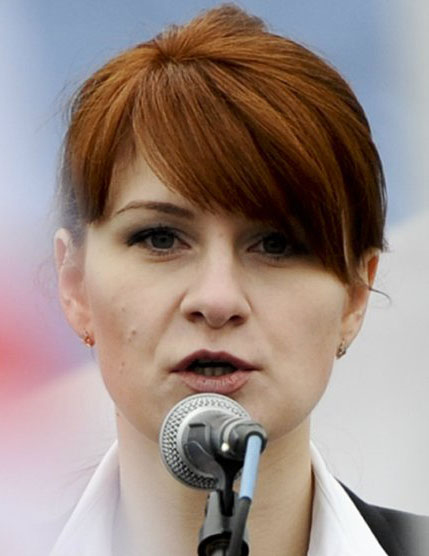WASHINGTON, (Reuters) – Admitted Russian agent Maria Butina was sentenced to 18 months in prison yesterday after the Siberia native, her voice breaking with emotion, begged a judge for mercy and expressed remorse for conspiring with a Russian official to infiltrate a gun rights group and influence U.S. conservative activists and Republicans.
U.S. District Court Judge Tanya Chutkan imposed a sentence that matched the prison term prosecutors requested and also agreed to have Butina, 30, deported back to Russia after she completes her incarceration. The sentence included the nine months Butina already has served in jail since her July arrest, meaning she has about nine more months behind bars.
Lawyers for Butina, a former graduate student at American University in Washington who publicly advocated for gun rights, had asked Chutkan to impose a sentence of time served and let her return to Russia.
Clad in a green prison jumpsuit, Butina implored Chutkan for leniency, calling her “dear judge.”
“For all the international scandal my arrest has caused, I feel ashamed and embarrassed. My parents taught me the virtue of higher education, how to live life lawfully, and how to be good and kind to others,” Butina said.
“I have three degrees, but now I’m a convicted felon with no job, no money and no freedom,” Butina added.
Butina pleaded guilty in December to one count of conspiring to act as a foreign agent, agreeing to cooperate with prosecutors. The case marked another irritant in fraught U.S.-Russian relations.
“This was no simple misunderstanding by an over-eager foreign student,” Chutkan said before imposing the sentence.
Butina admitted to conspiring with a Russian official and two Americans from 2015 until her arrest to infiltrate the National Rifle Association, a group closely aligned with U.S. conservatives and Republican politicians including President Donald Trump, and create unofficial lines of communication to try to shape Washington’s policy toward Moscow.
By coincidence, Trump addressed the NRA’s annual meeting in Indianapolis about an hour after Butina’s sentencing, drawing enthusiastic cheers by announcing the United States would abandon an international treaty regulating conventional arms sales.
In Moscow, Russia’s foreign ministry called Butina’s sentence “politically motivated,” saying in a statement: “Our countrywoman was sentenced only because she is a citizen of Russia.”
Prosecutors said while Butina did not engage in “traditional” spy craft, she worked behind the scenes to make inroads in conservative political circles and promote warmer U.S.-Russian relations. She arranged dinners in Washington and New York and attended events to meet prominent politicians.
Alexander Torshin, a deputy governor of Russia’s central bank, was the Russian official mentioned in the case. Torshin was not charged.
Butina’s case was separate from Special Counsel Robert Mueller’s investigation of Moscow’s interference in the 2016 U.S. election, which detailed numerous contacts between Trump’s campaign and Russia. Her activities, though, occurred during the same period as the contacts investigated by Mueller.






